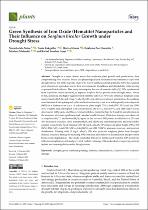Green synthesis of iron oxide (hematite) nanoparticles and their influence on sorghum bicolor growth under drought stress
Abstract
Drought is a major abiotic stress that confronts plant growth and productivity, thus
compromising food security. Plants use physiological and biochemical mechanisms to cope with
drought stress, but at the expense of growth. Green-synthesized nanoparticles (NPs) have gained
great attention in agriculture due to their environmental friendliness and affordability while serving
as potential biofertilizers. This study investigates the role of hematite ( Fe2O3) NPs, synthesized
from Aspalathus linearis (rooibos), to improve Sorghum bicolor growth under drought stress. About
18 nm, spherical, and highly agglomerated hematite ( Fe2O3) NPs were obtained. Sorghum seeds
were primed with 5, 10, and 15 mg/L Fe2O3 NPs, and, after seven days of germination, the seedlings
were transferred into potting soil, cultivated for fourteen days, and were subsequently water deprived
(WD) for a further seven days.

